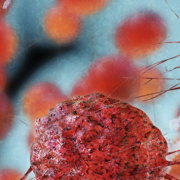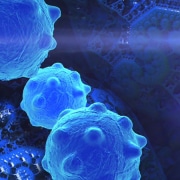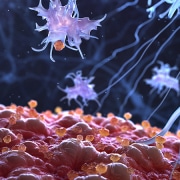Genomics and acute myeloid leukaemia
Aggressive and complex, AML often proves a challenge for clinicians, but genomic analysis is helping in the search for targeted treatments
In acute myeloid leukaemia (AML), tumour cells grow very quickly in the bone marrow, crowding out the stem cells that produce healthy blood cells, so patients require regular blood transfusions. AML is commonly treated with intensive chemotherapy – an approached that has remained unchanged for decades. It has been difficult to develop more targeted treatments due to the wide variety of disease drivers in different patients; AML is often described as a ‘series of diseases’ for this reason.
Linking mutations to outcomes
Researchers in the US have now produced a database that links specific mutations to drug sensitivities. The team at Oregon Health and Science University used whole exome sequencing and RNA sequencing on 672 tumour samples from 562 people with AML. 409 of the samples were also tested in vitro for sensitivity to 122 different targeted drugs.
The researchers found thousands of different mutations, some of which were new discoveries, and were able to sort the samples into 11 genetic classes. Most importantly, they were able to draw links between different mutations – or combinations of mutations – and the effectiveness of certain therapies.
“We show that the response to drugs is associated with mutational status, including instances of drug sensitivity that are specific to combinatorial mutational events”, said the paper, which was published in Nature. “Integration with RNA sequencing also revealed gene expression signatures, which predict a role for specific gene networks in the drug response.”
Sharing for better results
The paper’s authors, Dr Brian Druker and Dr Jeffrey Tyner, have made their data available online so that other researchers and clinicians can access it.
“Let’s say a physician sees an AML patient with a particular gene mutation. With the lab screening information we have, our dataset can be useful to see if that particular gene mutation corresponds with certain drug sensitivities. We believe this dataset will help researchers and physicians solve those specific kinds of questions more easily”, said Dr Tyner.
The team now hopes to follow up the study with clinical trials, using the dataset to assist in selecting therapies for patients.
A new, mutation-specific drug
Xospata (gilteritinib), which was approved by the US Food and Drug Administration (FDA) for people with AML in November 2018, is in the spotlight.
The drug is specifically for those patients who have a mutation in the FLT3 gene and who have relapsed or have cancer cells still present following chemotherapy.
“Approximately 25 to 30 percent of patients with AML have a mutation in the FLT3 gene. These mutations are associated with a particularly aggressive form of the disease and a higher risk of relapse”, said Dr Richard Pazdur, director of the FDA’s Oncology Center.
The FLT3 gene is expressed primarily in hematopoietic progenitor cells – the cells that give rise to blood cells. It encodes a cell surface receptor which is important in regulating differentiation, proliferation and survival of these stem cells.
Xosparta has not yet received marketing authorisation in Europe, but the European Medicines Agency has granted it fast-track and orphan drug designation, and clinical trials are taking place in the UK.
–









